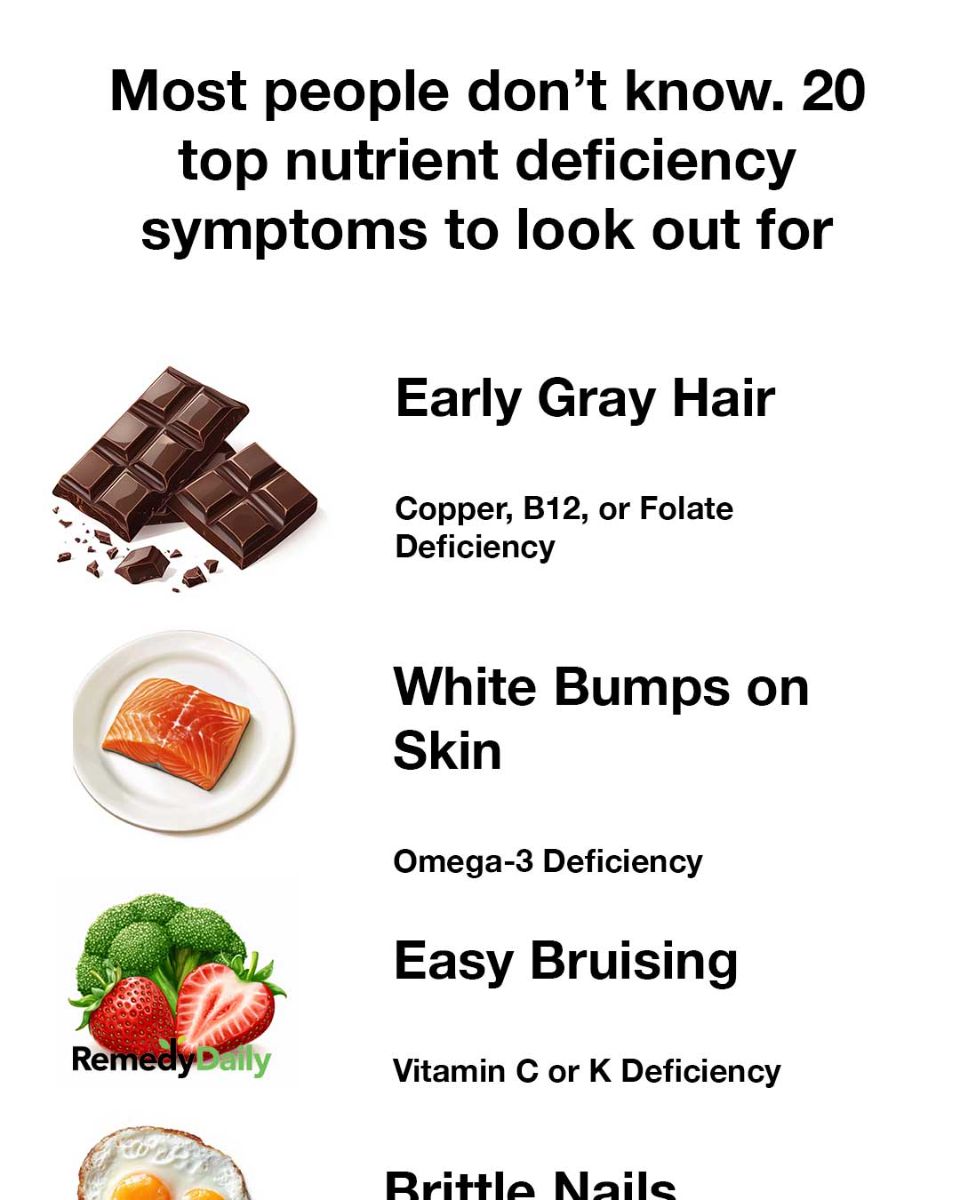Eggs (especially yolk)
Almonds, walnuts
Sweet potatoes
Salmon
Avocados
8. Frequent Infections: Vitamin D Deficiency
Vitamin D is crucial for immune function. A deficiency can lead to an increased susceptibility to infections, as the immune system relies on vitamin D to fight off pathogens effectively.
Eat:
Fatty fish
Fortified milk or orange juice
Egg yolks
Mushrooms exposed to sunlight
9. Poor Night Vision: Vitamin A Deficiency
Vitamin A is essential for maintaining healthy vision, particularly in low-light conditions. A deficiency can lead to night blindness, where the eyes struggle to adjust to darkness.
Eat:
Carrots, sweet potatoes, pumpkin
Spinach, kale
Liver
Cantaloupe, mango
10. Muscle Cramps: Magnesium Deficiency
Magnesium is vital for muscle function, and a deficiency can cause muscle cramps, spasms, and twitches. Magnesium helps regulate muscle contractions and relaxations.
Eat:
Nuts (almonds, cashews)
Dark leafy greens
Bananas
Whole grains
Dark chocolate (magnesium boost!) 🍫
11. Tingling in Hands and Feet: Vitamin B12 Deficiency
Vitamin B12 is essential for nerve health. A deficiency can lead to nerve damage, resulting in tingling or numbness in the hands and feet, known as peripheral neuropathy.
Eat:
Fish, meat, poultry
Eggs, dairy
Fortified cereals
Nutritional yeast
12. Mouth Ulcers: Folate or Iron Deficiency
Painful sores in the mouth, or ulcers, can be a sign of folate or iron deficiency. Both nutrients are important for cell growth and repair, and their lack can impair the healing process.
Eat:
Lentils, spinach, asparagus (folate)
Red meat, shellfish (iron)
Fortified grains
13. Cracked Lips: Riboflavin Deficiency
Cracked or sore lips, particularly at the corners of the mouth, can indicate a riboflavin (vitamin B2) deficiency. Riboflavin is important for maintaining healthy skin and mucous membranes.
Eat:
Milk, yogurt
Eggs
Almonds
Spinach, mushrooms
14. Dry Skin: Essential Fatty Acid Deficiency
Essential fatty acids, such as omega-3 and omega-6, are crucial for maintaining skin health. A deficiency can lead to dry, flaky skin, as these fats help maintain the skin’s barrier function.
Eat:
Salmon, sardines
Flaxseeds, chia seeds
Walnuts
Avocados
15. Restless Legs: Iron or Magnesium Deficiency
Restless leg syndrome, characterized by an uncontrollable urge to move the legs, can be linked to iron or magnesium deficiency. Both minerals are important for nerve and muscle function.
Eat:
Red meat, spinach (iron)
Pumpkin seeds, legumes, bananas (magnesium)
Dark chocolate (magnesium + mood booster) 🍫
16. Depression and Mood Swings: Omega-3 or Vitamin D Deficiency
Omega-3 fatty acids and vitamin D play roles in brain health and mood regulation. Deficiencies in these nutrients can contribute to depression and mood swings.
Eat:
Fatty fish (salmon, mackerel)
Walnuts, flaxseeds (omega-3)
Fortified dairy or plant milk (vitamin D)
Mushrooms and sunlight exposure
17. Bone Pain: Vitamin D Deficiency
Vitamin D is essential for calcium absorption and bone health. A deficiency can lead to bone pain and an increased risk of fractures due to weakened bones.
Eat:
Fortified dairy or almond milk
Sardines (with bones)
Egg yolks
Cod liver oil
18. Poor Wound Healing: Zinc Deficiency
Zinc is crucial for wound healing, as it supports cell growth and immune function. A deficiency can slow the healing process and increase the risk of infections.
Eat:
Shellfish (especially oysters)
Beef, pumpkin seeds
Chickpeas
Dairy
19. Swollen Gums: Vitamin C Deficiency
Vitamin C is important for gum health, and a deficiency can lead to swollen, bleeding gums. This is because vitamin C is necessary for collagen production, which maintains the integrity of gum tissue.
Eat:
Oranges, strawberries, kiwi
Bell peppers
Broccoli, Brussels sprouts
Guava (a vitamin C powerhouse!)
20. Cognitive Decline: Vitamin B12 Deficiency
Vitamin B12 is crucial for brain health, and a deficiency can lead to cognitive decline, memory loss, and confusion. This is because B12 is involved in the production of neurotransmitters and the maintenance of nerve cells.
Eat:
Clams, beef liver
Salmon, tuna
Fortified cereals
Eggs, milk
Dietary Solutions for Nutrient Deficiencies
Addressing nutrient deficiencies often involves dietary changes to include more nutrient-rich foods. For example, increasing the intake of leafy greens, lean meats, nuts, seeds, and fortified foods can help replenish nutrient levels. In some cases, supplements may be necessary under the guidance of a healthcare professional.
Conclusion: Maintaining Nutrient Balance for Optimal Health
Maintaining a balanced diet rich in essential nutrients is key to preventing deficiencies and promoting overall health. Regular check-ups and being mindful of dietary choices can help ensure that nutrient needs are met, supporting the body’s functions and preventing health issues associated with deficiencies.

Most people don’t know. 20 top nutrient deficiency symptoms to look out for
Pages: 1 2